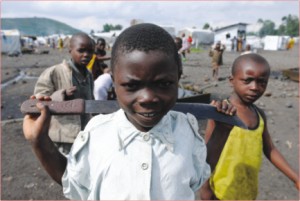
Inside
|
US officially in recession  The United States officially joins the recession camp on December 1, as an economic panel announces the downturn began a year ago, while a deluge of weak data pointed to a severe global slowdown. The grim news prompted heavy selling on global markets. A private panel of US economists charged with the official designation of business cycles said it had determined the world's largest economy has been in recession since December 2007. Although a recession is generally defined as two consecutive quarters of declining activity, the panel has its own criteria for determining a downturn based on a measure of income, employment and other factors.. Asian markets were in turmoil as investors sold off stocks following an eight percent overnight fall on Wall Street, which lost almost eight percent. Bhopal, 24 years later 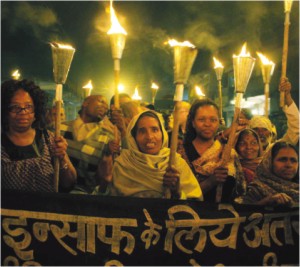 Hundreds gather to mark the 24th anniversary of the Bhopal Gas Tragedy in Bhopal, in memory of those who died when a cloud of methyl isocyanate leaked from the Union Carbide chemical plant, exposing at least 520,000 people to toxic gases early in the morning on December 3, 1984. The world's worst industrial accident, official figures state nearly 3,000 people died on the night of the disaster, and there have been nearly 15,000 deaths related to the accident. However, campaign groups put the figures much higher. Many local people still suffer respiratory and other illnesses and say their water supplies are still contaminated. The Indian government is awaiting the outcome of a US court hearing on whether Dow Chemicals, which took over the plant from its subsidiary Union Carbide, should be asked to clean up the site. Mumbai Killings 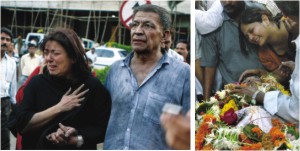 For three nights, a small group of well-trained Islamic militants transforms downtown Mumbai into a war zone. Indian security officials said at least a dozen attackers slipped into the city by boat on Wednesday evening, having been dropped off near the coast by a larger ship. Intelligence sources said another group had been in the city for a month, conducting "extensive reconnaissance" and pre-positioning stockpiles of arms and ammunition, ready for protracted battles. The two groups linked up and the carnage began. The siege finally ended 60 hours later, with at least 195 dead and 295 wounded. The dead included guests at two luxury hotels -- the Taj Mahal, one of Mumbai's most famous landmarks, and the Oberoi/Trident -- plus a Jewish centre and hostel for Israeli visitors. Among the first targets was Chhatrapati Shivaji railway station, where at least two men sprayed automatic weapons fire and lobbed grenades into a crowd of unsuspecting travelers, leaving behind a pile of nearly 50 bodies. Evading capture as Indian security forces rushed to the station, the gunmen then attacked a charitable hospital for women and children, the Cama Hospital, shooting indiscriminately. Another group hit the Cafe Leopold, one of Mumbai's best-known restaurants and a favoured haunt of tourists and expatriates. Among the total of 195 people confirmed killed were 27 foreigners, including Israelis, Americans, French nationals, Australians, Canadians, Germans, a Japanese, a British Cypriot, an Italian, a Singaporean and a Thai. Eleven militants were confirmed dead, but one -- identified as a Pakistani -- was captured. Around 15 security personnel were also killed. With the attack in motion, an unknown group calling itself the "Deccan Mujahedeen" said it was responsible. Second death penalty for “Chemical Ali” 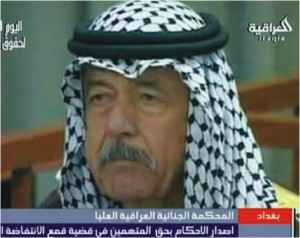 An Iraqi court condemns Saddam Hussein's notorious hatchet-man Ali Hassan al-Majid, known as “Chemical Ali”, to death for war crimes committed over the crackdown of Shiites during their ill-fated 1991 uprising. Majid, 67, is a cousin of Saddam and had already received a death penalty after being convicted for genocide after ordering the deaths of tens of thousands of Kurds during the 1988 Anfal campaign, when Iraqi forces strafed villages with poison gas, the source of his grim nickname. Thai protests finally called off 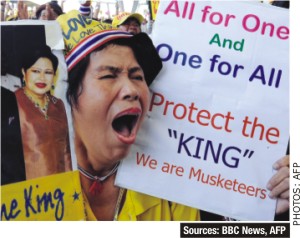 Thai anti-government activists agree on December 2 to end protests that have paralysed Bangkok's airports, after a court stripped Prime Minister Somchai Wongsawat of his post and outlawed the ruling party. The royalist People's Alliance for Democracy movement said it would lift its siege of the airports, and halt a 192-day campaign that has seen off two prime ministers allied to exiled former leader Thaksin Shinawatra. Somchai, 61, spent less than three months in power, beset by the royalist protesters who accused his government of acting as a proxy for Thaksin and of being hostile to the monarchy. The crippling blockade left 350,000 passengers stranded and caused massive economic losses to the tourism-dependent kingdom. |

